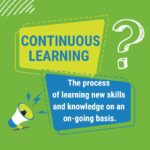I lost a job I loved in 2018. I had intended to stay there until I turned 65 and retired. But, it did not work out that way. In addition to being disappointed, I was also discouraged. On top of that I was unsure of what to do next. My husband encouraged me to think about working for myself because I had a small business idea. Fortunately, he recalled a small business program I could apply for, to learn about entrepreneurship. I was approved, and a new phase of learning began.
The education process has continued ever since. Whether it’s new information or skills I’m picking up on the job or finding the time to take a course, it seems like I’m always learning something new. Heraclitus said, “The only thing that is constant is change.” Operating in a market that is not only competitive but also constantly changing requires sole proprietors be open to continuous learning.
What is Continuous Learning 
Continuing education is when you keep learning and developing new skills even after you’ve finished a formal education or training program. According to Amit Nagpal, it is “your self-motivated persistence in acquiring knowledge and competencies in order to expand your skill set and develop future opportunities. It forms part of your personal and professional development in an effort to avoid stagnation and reach your full potential.”
Whatever way you decide to keep learning, the aim is to stay up-to-date with industry trends. You want to maintain your expertise throughout your career.
Why It’s Important for Business Success
From the moment we are born, we are learners. In fact, “it is essential to our existence. Just like food nourishes our bodies, information and continued learning nourish our minds.” (Amit Nagpal) It stands to reason that this same principle applies to running a small business.
The following 7 reasons should encourage you to never stop learning:
- Keeps You Current: Continuous learning keeps you up-to-date with industry trends and changes. By learning, you will avoid lagging behind. Furthermore, you will stay relevant to your industry. You must continue to learn new things in order to be useful in the rapidly evolving technological world.
- Improves Your Skills: Learning adds to the skills you already have, making you better able to take on new challenges. In turn, your confidence and competence will grow.
- Keeps You Competitive: It gives you a competitive edge over others in your field. When you’re always learning, you’ll continue to advance. You will likely receive recommendations from customers and clients.
- Enhances Your Decision-Making and Creativity: It improves your critical thinking skills, enabling you to make more informed and effective decisions. Furthermore, learning new skills will open up new possibilities for you. It will assist you in coming up with creative answers to issues.
- Opens New Doors: Learning new skills can open up new business opportunities.
- Expands Your Network: Learning can help you meet new people and build connections in your industry, which can lead to new business opportunities.
- Helps you Adapt to change: By building on what you already know, continuous learning can change your way of thinking and how you see things. As you learn more, you’ll be able to see more perspectives on the same issue. This helps you stay adaptable and flexible in an ever-changing business landscape.
How To Invest into Continued Learning
A. Determine It is Worthwhile
If you are like me, it didn’t take you long to figure out that there is so much to learn when running a business. Over time, it becomes clear that there is always an area where you can improve. Even though it will take time and energy, you need to be convinced it is worth it. Having read the previous, you may now be convinced.
The second thing is to determine which areas are priorities and then prioritize those. Trying to learn too much too fast can be detrimental to your productivity. You might want to ask yourself the following questions:
- What are my biggest challenges or pain points?
- Which areas of the business do I struggle to keep up with?
- How is the feedback from my customers?
- Are there any areas where I can reduce costs or improve efficiency?
Once you have answered these questions, you can focus on an area and begin your research. As you learn, take the Kaizen approach. Apply what you are learning by making frequent, slow, incremental adjustments. Then, evaluate.
B. Determine Your Learning Style
As a former teacher, I became aware that not all individuals learn best in the same way. Essentially, there are three main ways you can learn:
Visual Learning: This involves using images, diagrams, videos, and other visual aids to help understand and retain information.
Auditory Learning: This involves using sound, such as lectures, podcasts, and discussions, to learn and retain information.
Kinesthetic Learning: This involves hands-on learning, where you learn by doing or practicing a skill, such as through simulations or interactive workshops.
By figuring out how you learn best and actively looking for ways to learn in that way, you can improve your knowledge and skills, which will help your business grow.
C. Select the Best Resource for Your Learning Style
As mentioned earlier, knowledge is available at our fingertips. Furthermore, there are more resources available than ever before. Some of these resources are:
- Online Courses and Training Programs: There are many online courses and training programs available on platforms like LinkedIn Learning, Udemy, and Coursera. Some are free, while others require payment. Virtual Instructor-Led Training (VILT) is a popular type of continuing education.
- Associations and organizations for a specific industry: Joining an association or organization for a specific industry can give you access to resources, chances to network, and information about the industry.
- Industry Publications and Blogs: Subscribe to industry publications and blogs to stay informed about the latest trends and news in your field.
- Business Books: There are many business books available that can provide valuable insights and tips for running a successful business.
- Webinars and Podcasts: Many organizations offer webinars and podcasts on a variety of topics, including business development, marketing, and sales.
- Mentors and Coaches: Finding a mentor or coach who can provide guidance and feedback can be a valuable learning experience.
- Local Workshops and Seminars: Look for local workshops and seminars related to your industry or business needs.
Sole proprietors can keep learning and growing their businesses by taking advantage of these tools.
Overcoming Barriers to Continued Learning
As a sole proprietor, it can be challenging to find the time and energy to continue learning while running your business. But there are a number of ways to get around these problems and make learning a priority:
- Schedule Learning Time: Set aside dedicated time each week for learning. This could be as little as 30 minutes a day or a few hours each week.
- Use Commute Time: Use your commute time to listen to podcasts or audiobooks related to your industry or business.
- Commit to One or Two Events a Year: Attend conferences and events related to your industry to gain new insights, network with other professionals, and stay up-to-date with the latest trends. Be sure to schedule this on your calendar.
- Hire a Virtual Assistant: Hiring a virtual assistant can help free up time for learning by taking on administrative tasks and other responsibilities.
You can get past the barriers if you make learning a top priority and use these strategies. You will improve your knowledge and skills, ultimately leading to greater success for your business.
Wrap Up
As a sole proprietor, you need to keep learning to stay competitive, grow your business, and improve yourself and your career.By using the resources you have and getting past the things that stop you from learning, you can keep improving your knowledge, skills, and, in the end, the success of your business.
Remember, continued learning is a lifelong journey, and it requires commitment, dedication, and effort. But the benefits are worth it. By learning new strategies, techniques, and insights, you can improve your business operations, better serve your customers, and ultimately achieve your goals.
So don’t be afraid to leave your comfort zone, look for new opportunities, and keep learning to help your personal and professional growth.With time and effort, you can achieve great things and take your business to new heights.
_______________________________________________________________________________________________________________
Pro Ledger Online offers a cloud-based bookkeeping solution for small business professionals. Click here for a 30-day free trial. – www.pro-ledger.com “Bookkeeping Made Simple
The post Continuous Learning: How Its Important for Your Business first appeared on Online Bookkeeping Software for Small Business | Easy & Inexpensive.

Recent Comments